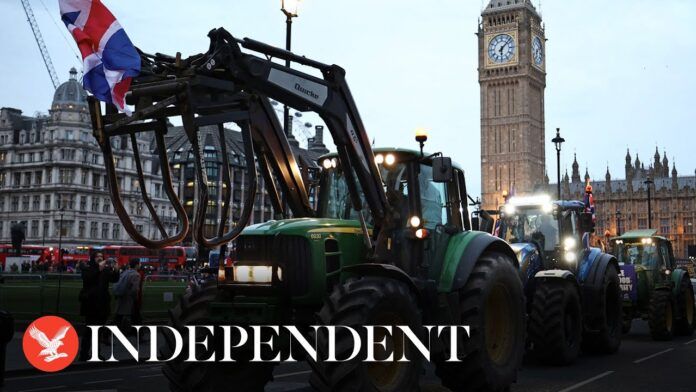Save British farming movement protests in London, urges fairness and security for farmers
Farmers across the United Kingdom have taken to the streets in a significant protest against the current post-Brexit rules and trade agreements, which they claim are endangering their livelihoods and the nation’s food security. The movement, orchestrated by Save British Farming and Fairness for Farmers, saw a slow-moving convoy of tractors traversing south London to Parliament Square, with demonstrators sounding car horns and brandishing signs proclaiming “no farmers, no food, no future.” The protest aims to spotlight the government’s trade deals that permit the importation of food produced below UK standards, severely undercutting British farmers.
Liz Webster, the founder of Save British Farming, expressed deep dissatisfaction with the government’s approach, accusing it of negotiating what she termed “the worst trade deals in the world.” “They’re not telling the truth,” Webster stated, highlighting the dire consequences these agreements have for the local farming community. “We have been totally and utterly let down by this government,” she added, demanding immediate change to support the nation’s agricultural sector.
The UK’s departure from the European Union has placed its agricultural sector at a crossroads, stripping away the benefits of the bloc’s free trade zone and introducing a plethora of bureaucratic challenges, exporting hurdles, and labour shortages. The post-Brexit landscape has been particularly harsh for sectors reliant on seasonal migrant labour, such as sparkling wine production, which has had to resort to volunteer labour due to the drastic reduction in migrant workers post-Brexit.
Although many British farmers initially supported Brexit, hoping for liberation from the EU’s Common Agricultural Policy, the reality of post-Brexit trade deals with countries like Australia and New Zealand has brought unforeseen challenges. These agreements have flooded the UK market with cheap imports, against which local farmers find it difficult to compete. Additionally, there has been criticism of labelling practices that allow products to bear a Union flag without being grown or reared within the country.
The UK is not alone in experiencing farmer-led protests; across the European Union, farmers in Poland, France, and Germany have also taken to the streets. They are voicing their frustrations over bureaucratic red tape, environmental policies, and competition from foreign imports, which they claim are pushing them towards bankruptcy.
Public opinion in the UK regarding Brexit has notably shifted, with recent polls indicating a majority of Britons now believe that leaving the EU has negatively impacted the country’s economy. A survey conducted by Opinium, involving over 2,000 UK voters, revealed a significant decline in the number of people who feel Brexit has benefited either them personally or the country at large.
As farmers’ protests continue to make headlines, the call for revisiting and potentially revising post-Brexit trade agreements and agricultural policies grows louder, underscoring the need for solutions that safeguard the future of British farming and food security.
